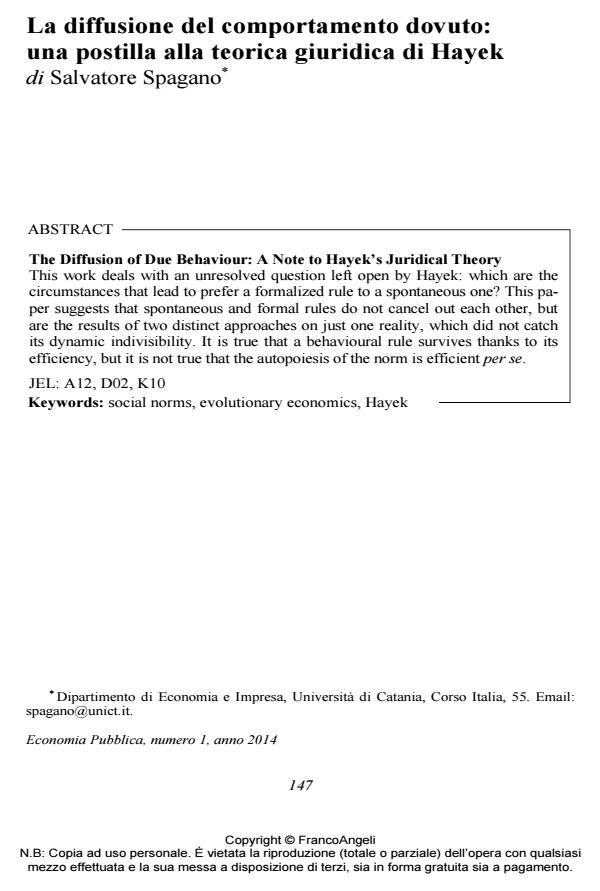The Diffusion of Due Behaviour: A Note to Hayek’s Juridical Theory
Journal title ECONOMIA PUBBLICA
Author/s Salvatore Spagano
Publishing Year 2014 Issue 2014/1 Language Italian
Pages 14 P. 147-160 File size 168 KB
DOI 10.3280/EP2014-001007
DOI is like a bar code for intellectual property: to have more infomation
click here
Below, you can see the article first page
If you want to buy this article in PDF format, you can do it, following the instructions to buy download credits

FrancoAngeli is member of Publishers International Linking Association, Inc (PILA), a not-for-profit association which run the CrossRef service enabling links to and from online scholarly content.
This work deals with an unresolved question left open by Hayek: which are the circumstances that lead to prefer a formalized rule to a spontaneous one? This paper suggests that spontaneous and formal rules do not cancel out each other, but are the results of two distinct approaches on just one reality, which did not catch its dynamic indivisibility. It is true that a behavioural rule survives thanks to its efficiency, but it is not true that the autopoiesis of the norm is efficient per se.
Keywords: Social norms, evolutionary economics, Hayek
Jel codes: A12, D02, K10
- Aoki M. (2001). Endogenizing Institutions and Institutional Changes. Journal of Institutional Economics, 3: 1-31, DOI: 10.1017/S1744137406000531
- Axelrod R. (1986). An Evolutionary Approach to Norms. The American Political Science Review, 80: 1095-1111, DOI: 10.2307/1960858
- Binmore K. (1998). Game Theory and the Social Contract (Vol II): Just Playing. Cambridge MA: MIT Press.
- Binmore K. (2001). Evolutionary Social Theory: Reply to Robert Sugden. The Economic Journal, 111: 244-248, DOI: 10.1111/1468-0297.00605
- Buchanan J.M. (1990). The Domain of Constitutional Economics. Constitutional Political Economy, 1: 1-18, DOI: 10.1007/BF02393031
- Buchanan J.M. (1998). I Limiti della Libertà. Milano: Rusconi.
- Buchanan J.M. e Tullock G. (1998). Il Calcolo del Consenso. Bologna: il Mulino.
- Conforti B. (2010). Diritto Internazionale. Napoli: Editoriale Scientifica.
- Dia E. (2002). Ordine Spontaneo e Regole: L’Ottimalità dei Vincoli all’Agire Umano. Working Paper Series, n. 57, Department of Economics, University of Milan, Bicocca.
- Elias T.O. (1956). The Nature of African Customary Law. Manchester: The University Press.
- Gintis H. (2000). Game Theory Evolving. Princeton NJ: Princeton University Press.
- Guastini R. (1993). Le Fonti del Diritto e l’Interpretazione. Milano: Giuffrè.
- Hayek F. (1986). Legge, Legislazione e Libertà. Milano: il Saggiatore.
- Hoebel . A. (2006). The Law of Primitive Man. Cambridge MA: Harvard University Press.
- Hume D. (1978). A Treatise of Human Nature. Clarendon Press: Oxford.
- McCormick R. e Tollison R. (1981). Politicians, Legislation, and the Economy – An Inquiry into the Interest-Group Theory of Government. Boston: Nijhoff.
- Ostrom E. (2000). Collective Action and the Evolution of Social Norms. The Journal of Economic Perspectives, 14: 137-158, DOI: 10.1257/jep.14.3.137
- Richerson P.J. e Boyd R. (2005). Not by Genes Alone: How Culture Transformed Human Evolution. Chicago: The University of Chicago Press.
- Savigny F.C. (1968). La Vocazione del Nostro Secolo per la Legislazione e la Giurisprudenza. Bologna: Forni.
- Smith A. (1995). La Ricchezza delle Nazioni. Roma: Newton Compton.
- Sugden R. (1989). Spontaneous Order. The Journal of Economics Perspectives, 3: 85-97, DOI: 10.1257/jep.3.4.85
- Sugden R. (2001). Ken Binmore’s Evolutionary Social Theory. The Economic Journal, 111: 213-243, DOI: 10.1111/1468-0297.00604
- Voigt S. (1997). Positive Constitutional Economics: A Survey. Public Choice, 90: 11-53, DOI: 10.1007/978-94-011-5728-5_2
- Voigt S. (2001). Positive Constitutional Economics II – A Survey of Recent Developments. Public Choice, 141: 205-256, DOI: 10.1007/s11127-010-9638-1
Salvatore Spagano, La diffusione del comportamento dovuto: una postilla alla teorica giuridica di Hayek in "ECONOMIA PUBBLICA " 1/2014, pp 147-160, DOI: 10.3280/EP2014-001007